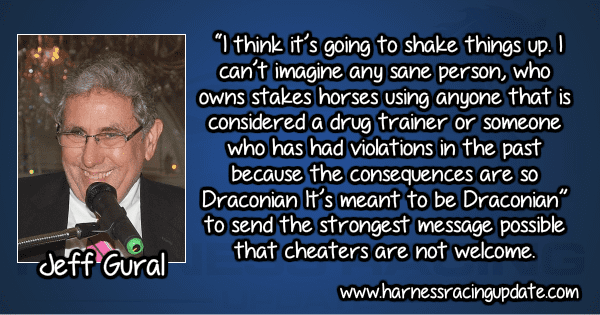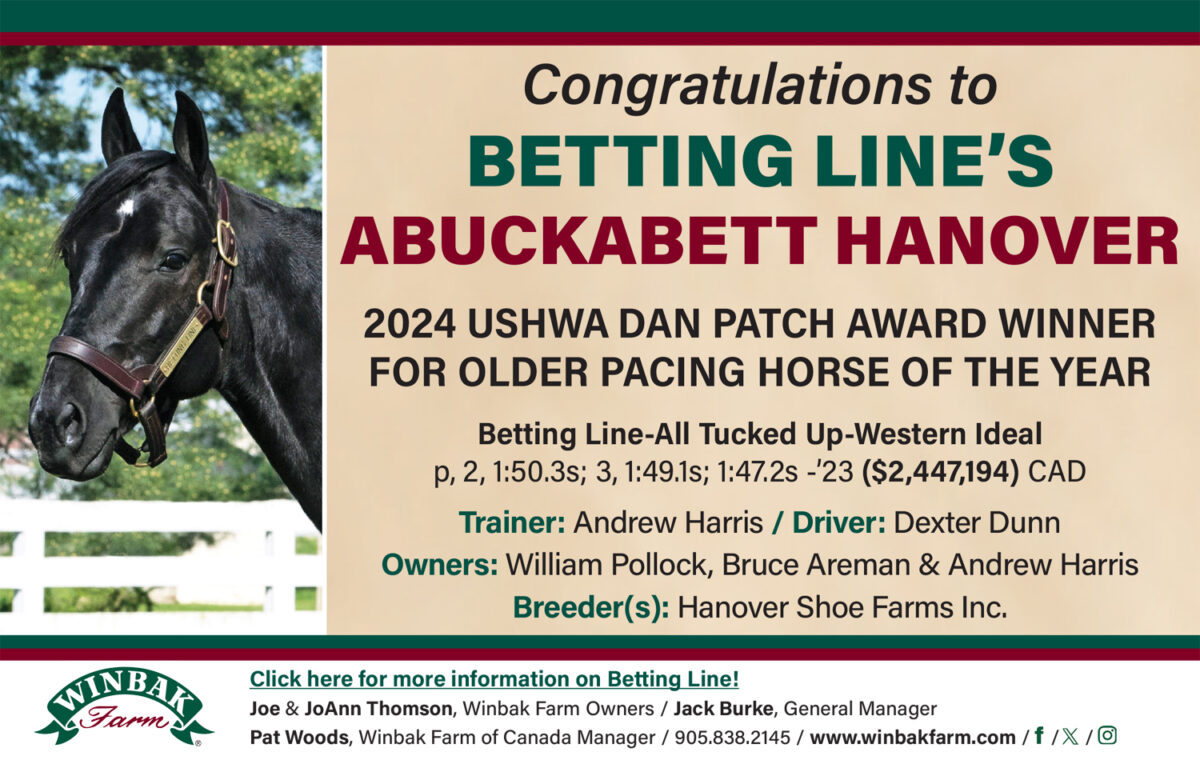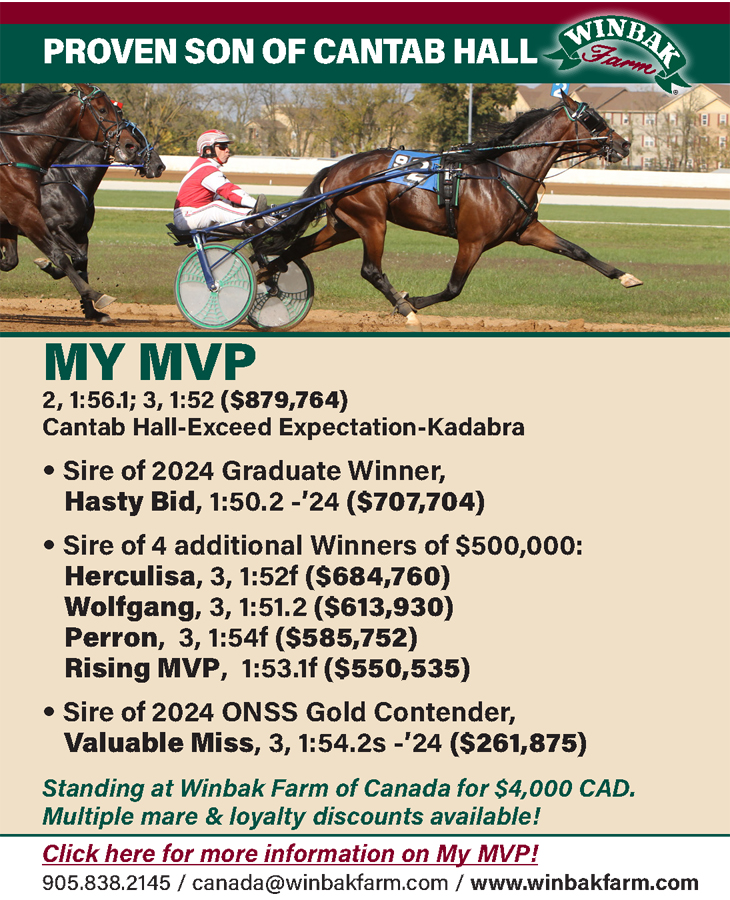
Owners the focus of tough new WEG and Big M rule
One positive test in 2018 could lead to owners, trainers and horses being banned from all stakes races at the two WEG tracks and the three Jeff Gural-owned tracks.
by Dave Briggs
Owners and trainers take heed: one positive test in 2018 could result in all of your horses being banned from all stakes races at the Woodbine Entertainment Group (WEG) tracks and the Meadowlands, Tioga and Vernon Downs.
The new rule called the Standardbred Racing Integrity and Accountability Initiative (SRIAI) is a partnership between WEG-operated Mohawk and Woodbine and the three Jeff Gural-owned tracks and is already in effect for 2018.
WEG chairman Clay Horner, a long-time proponent of enhanced owner responsibility, said he hopes the tough new integrity rule, announced Friday (Jan. 5), will force horse owners to make better trainer choices.
“The objective here is for owners to be very vigilant and very careful,” Horner said Friday of the SRIAI that bans any owner, trainer or horse from participating in stakes races at the five racetracks in 2018 if they have been found by a racing regulatory agency to have tested positive for prohibited substances as defined within the Association of Racing Commissioners International Uniform Classification for Foreign Substances of Class I, II, TCO2 or steroids after Jan. 1, 2018.
Mohawk president Jessica Buckley said it’s important to note the Canadian Pari-Mutuel Agency (CPMA), which oversees the wagering side of the sport in Canada, told WEG the number of positive tests is minimal each year.
“We did have a presentation from the CPMA at the end of December and we were really pleased to see the amount of tests that are being done and the super low percentage of positives,” Buckley said. “This isn’t a measure that we’re taking because (the sport has) suddenly become dirty. It’s really not the case. However, it’s so important for us as stewards in the industry to be able to give confidence to existing owners and new owners and the players… it’s important for them to believe in the integrity of our product.”
Despite the low number of Class I, II, TCO2 and steroid positives, Horner explained that if a horse receives such a positive, the owner or owners of that horse will be banned from competing in stakes at the aforementioned tracks in ’18 with any horse in which they own at least a 25 per cent share.
“Say Owner A has a horse with Trainer A. If Trainer A has a positive test of one of these natures, then all of Owner A’s horses in which he or she owns 25 per cent or more are disqualified from future participation, regardless of who the partners are and regardless of who the trainer is,” he said.
“We want partners to say to their fellow partners, ‘Look, I see that you’ve got horses with somebody that is riskier than the trainer that we have horses with together. It would be a terrible thing for there to be mistake, or something that’s done, that could impact us all here. And, in particular, for me to suffer that bad consequence because you weren’t careful and diligent in your choice of trainers.’”
“Say Owner A has a horse with Trainer A. If Trainer A has a positive test of one of these natures, then all of Owner A’s horses in which he or she owns 25 per cent or more are disqualified from future participation, regardless of who the partners are and regardless of who the trainer is.”
— Clay Horner
Rule restricts horse transfers
Furthermore, Horner said the rule is partly designed to prevent owners from moving horses to other barns in the event of a positive test.
“I would say that is, for lack of a better word, the toughest and most novel provision here and it’s expressly designed to address some of the ownership patterns and behaviors in harness racing,” Horner said.
“There’s no transferring of the horse. Put it this way, there’s no selling Lady Shadow to new owners who can participate in future events. When your horse is out, you’re out. Just think about it, if you’ve got a horse in the North America Cup and another one of your horses gets caught with a positive from a bad trainer and puts your North America Cup horse out, you can sell the horse, but he still can’t race in any of the WEG or Meadowlands stakes for that year. Think of what that means to the value.”
Vital to horses and bettors
The Central Ontario Standardbred Association (COSA) that represents the people that race on the WEG circuit signed off on the rule. So has prominent horse owner John Fielding who is on the WEG board. Fielding said the rule protects horses and bettors and should help improve the sport’s integrity.
“Not only is it good for the sport from an integrity point of view, it’s vital to the animal, it’s integral to the health of the animal,” Fielding said Saturday. “From a humane point of view, we’re protecting the animal as much as the industry, as much as the other owners, as much as the fair trainers who get up at 5 every day and work their nuts off and get outsmarted by somebody with a better mousetrap.
“We’re also trying to attract bettors… We’ve been talking about it for years, how do we get younger people, newer people, wealthy people, non-wealthy people involved in this sport? Well, if you come in on a non-level playing field, why would anyone come into the business?
Horner said WEG started the initiative and then approached Gural and his team to be partners.
“I think it’s going to shake things up,” Gural said Saturday. “I can’t imagine any sane person, who owns stakes horses using anyone that is considered a drug trainer or someone who has had violations in the past because the consequences are so Draconian.”
Asked about his use of the word “Draconian” to describe the rule, Gural said, “It’s meant to be Draconian” to send the strongest message possible that cheaters are not welcome.
Gural said it was “vitally important” to partner with WEG on the rule.
“I think if I had done it on my own, it would have had little or no impact and if (WEG) had done it on their own it would have had more impact, but not as much,” Gural said. “Now, you really are looking at some major races.”
John Campbell said he’s been in contact with the Hambletonian Society’s executive committee about the new rule, “and we’re actually going to discuss it again at the start of (this) week. It’s something that our full board will discuss in March. It’s an issue that will go before our full board and I will take their direction after this March meeting.”
Campbell consulted on the rule
Horner said WEG has been working on the details of the initiative “for seven or eight months” and received help from Hambletonian Society president and CEO John Campbell.
“One of the guys that was very helpful to us was John Campbell,” Horner said. “We initially were planning to include Class IIIs and John’s advice, which always turns out to be terrific advice, was that it’s a harder area because there is some therapeutic stuff (in Class IIIs), some non-therapeutic stuff. He said. ‘Why don’t you start off with (Class) Is, IIs, TCO2s and steroids? There should be nobody milkshaking a horse that doesn’t know they are doing it, so there’s no chance of a mistake. Same thing with steroids…’ If there’s a reason to think that we should add Class IIIs in another year then we can do that.”
Campbell said Saturday that, “Basically, I was just a consultant and brought up some scenarios. It took a while to get the wording they were looking for and I just brought up some scenarios with previous wording that I don’t think they were looking for that could happen. But it’s their initiative. It’s not (the Hambletonian Society’s), by any stretch.
“I certainly don’t have sympathy for guys who are drugging horses, but I do have sympathy for trainers that get caught for these Class IIIs and Class IVs that are therapeutic, just because it’s very easy to get one. It’s like a minefield for these trainers with the different thresholds and what’s allowed in certain states and other states it’s not. I’m certainly cognizant of what these trainers go through trying to train horses, keep them healthy, and not get a positive test with a therapeutic.”
Hoping others will adopt the rule
Horner said WEG would approach other tracks and other jurisdictions about adopting the rule.
“We are taking the lead and we’ll take accountability and responsibility for it, but we think everybody should join us,” Horner said.
“We certainly hope the Hambletonian Society will join us.”
Campbell said he’s been in contact with the Hambletonian Society’s executive committee about the new rule, “and we’re actually going to discuss it again at the start of (this) week. It’s something that our full board will discuss in March. It’s an issue that will go before our full board and I will take their direction after this March meeting.”
Gural said he also hopes other tracks will adopt the rule.
“I think it would be very embarrassing for the sport, truthfully, to have a horse that couldn’t race at the Meadowlands or Mohawk and yet won a Breeders Crown race at Pocono. I think social media would go crazy.”
Horner said bettors are “always top of mind and, obviously, the thinking was that they should be able to have greater confidence. One of the things we don’t think gives (bettors) confidence is something like a stop gap point of view like last year, in terms of replacement or stand-in trainers that leaves bettors wondering, ‘What’s the deal here?’”
“Not only is it good for the sport from an integrity point of view, it’s vital to the animal, it’s integral to the health of the animal. From a humane point of view, we’re protecting the animal as much as the industry, as much as the other owners, as much as the fair trainers who get up at 5 every day and work their nuts off and get outsmarted by somebody with a better mousetrap. We’re also trying to attract bettors… We’ve been talking about it for years, how do we get younger people, newer people, wealthy people, non-wealthy people involved in this sport? Well, if you come in on a non-level playing field, why would anyone come into the business?”
— John Fielding
Improved consistency and transparency
Horner said the rule is designed to create consistency and transparency.
“One of the objectives here was to say, ‘Here are the rules. They are right here. You know what they are and you know what the penalties are. They penalties are significant and it applies to everybody. There will be no favorites or the possibility of favoritism. There’s no discretion in these rules. Anyone who is offside is out – big guy, little guy, bad guy. So, for all of you that think the track owner plays favorites, here it is,’” Horner said.
Fielding said the rule is, “the same for everybody. So if Jeff Gural is employing a trainer who all of a sudden goes to the dark side, or is partners with someone on the dark side, then it’s going to affect him. It’s a fair deal.”
Gural said he hasn’t evaluated his own partnerships, yet, to find out which trainers some of his partners use, but he does have a lot of horses racing with different trainers and partners.
“I would never use someone that I thought was a drug trainer, but I use Ake (Svanstedt) and he had a positive (for a Class IV drug in 2016),” Gural said. Under the rule, in which Class III and IV positives are currently exempt, Gural’s horses would still be eligible to race had Svanstedt’s Class IV positive come in 2018.
Fielding also races a lot of horses but said, “most of mine are centered around two or three trainers now… I know all my partners… In the case of Jimmy Takter, I let him call most all of the shots, so it doesn’t really affect me. If Jimmy gets himself in trouble or wants to take on owners that have had trouble in the past with other trainers, then that’s his decision and now he’ll be more aware of that. If it’s going to affect the horse, I don’t think he’ll do it.”
Horner said both Fielding and fellow WEG director Doug Millard, “are big owners with a lot of partners and a lot of horses and both of them said at the Standardbred Committee, ‘We have to do this. This is the right thing to do.’”
“I think it’s going to shake things up. I can’t imagine any sane person, who owns stakes horses using anyone that is considered a drug trainer or someone who has had violations in the past because the consequences are so Draconian… It’s meant to be Draconian” to send the strongest message possible that cheaters are not welcome.
— Jeff Gural
Drive owners away?
But will the new rule drive some owners out of the game?
“Not to be Pollyanna-ish about it, but our objective and our hope is, at the end of year one and year two and year three, to look and see more and better quality owners, as opposed to fewer and riskier owners,” Horner said. “We recognize that, yes, some people will find this to be a deterrent to them staying in the game because they are only prepared to play on a risky basis or operate with someone that they either know, or ought to know, is at risk of falling afoul of these rules.
“The whole purpose here is to be respectful and instill confidence in good owners, that when they put up that money, and they have the big horse, they are going to have a fair ground to compete on in the biggest races.”
Campbell said he has no idea how the rule will impact the sport. “It’s really an unknown what the impact of it is going to be. I don’t know how owners will approach this as far as the trainers they hire,” he said.
Gural said he thinks it will take a year to figure out if the rule has a positive impact.
“One of two things is going to happen… some trainers will lose horses and some trainers will probably just stop using drugs because they just can’t afford to take a chance. So, then the question becomes, ‘How do their horses perform without drugs?’
“It’s possible that someone who uses drugs says, ‘I’ve got to stop using drugs because I’m not going to take a chance on getting caught milkshaking a horse’ and then all of a sudden their percentage goes down and then they lose owners anyway,” Gural said.
“We did have a presentation from the CPMA at the end of December and we were really pleased to see the amount of tests that are being done and the super low percentage of positives. This isn’t a measure that we’re taking because (the sport has) suddenly become dirty. It’s really not the case. However, it’s so important for us as stewards in the industry to be able to give confidence to existing owners and new owners and the players… it’s important for them to believe in the integrity of our product.”
— Jessica Buckley
Honest trainers could benefit
Will honest trainers that have struggled to get good horses benefit from the new rule? Buckley said that is a likely outcome.
“Definitely, that will be a spin-off effect of this in the best possible way. All of the best horsemen will rise to the top,” Buckley said.
Horner said he likes the idea of the honest operators getting a better opportunity to compete.
“There are some terrific trainers out there who have a hard time attracting high-profile horses and owners in a very competitive context. One would like to think that this is going to be a good thing for those guys,” said Horner, who has long championed integrity issues and fought against owners that try to flaunt the rules.
“It’s been a concern and interest of mine for a long time. I’m just thrilled to have the support of so many people at WEG and the Meadowlands, along with John Campbell… It really was a very powerful moment at our Standardbred Committee meeting when it went through,” Horner said, adding Buckley and Bill McLinchey, WEG’s senior manager of wagering operations, did a lot of the leg-work and approached both COSA and the Alcohol and Gaming Commission of Ontario (AGCO) for consultation.
“We have COSA’s blessing for what we’re doing and we’ve had a review of it from an AGCO perspective as well,” he said.
Will the runners adopt the rule?
Fielding, who is also deeply active in the thoroughbred world as a breeder, said he would like to see WEG adopt the rule for both breeds.
Buckley said she is sure WEG’s Thoroughbred Committee “will also be reviewing (the rule) and will make a decision down the road… This really was a standardbred initiative to begin with. We collaborated with the Meadowlands on it, so it’s standardbred for now.”
“A better way to put it,” Horner said, “might just be that the standardbreds are ahead as far as that’s concerned.”
Horner said the rule was modeled off rules from the thoroughbred Breeders’ Cup, “but there are some things here that are entirely new and a real step forward, we think, from a standardbred point of view. We’re pretty excited about it… The Breeders’ Cup applies to trainers and horses and it applies to Class Is, Class IIs and steroids. What we’ve added are TCO2s and what we’ve added are the owner provisions.”
Gural’s integrity fight
Meanwhile, Gural said he’s also, “working hard to find out what drugs are being used by these trainers. So, I’m approaching it on two fronts – one, this front, and the other is using out-of-competition testing and using Hong Kong and using informants and other typical methods to determine what drugs are being used. I think the main thing that’s being used to improve a horse’s performance dramatically is painkillers. I think EPO helps and some other things help, but what really helps is if you have a horse and he can’t finish the mile because he’s in pain and now that pain is gone away he can finish the mile.
“Either way, I’m not giving up on catching bad guys, so one way or the other we’re going to put an end to the drugs.”
“I think Jeff Gural has been fighting this for a long time,” Fielding said. “We’re trying to attract new owners to the sport. We’re trying to attract bettors. We’re trying to sustain the sport that we all love and the integrity piece is always a cloud hanging over our head as an industry. I think (the new rule is) a great first step. It might not be perfect and may need to be tweaked later on in certain areas, but I think it’s a very good first step… Clay Horner is probably the smartest guy I’ve ever met in my life and he’s put a lot of deep thought into this. I think it comes out pretty well.”













